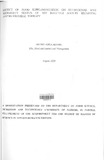| dc.description.abstract | Clinical studies to evaluate the role of supplementary foods or nutrition therapy in reversing
malnutrition and its impact on health and survival have not been done in Human
immunodeficiency virus-infected individuals living in resource poor settings. The main
objective of this study was to assess the effect of food supplementation on nutritional status and
morbidity experience of malnourished human immunodeficiency virus infected adults receiving
antiretroviral therapy.
The study was conducted from July 2006 to April 2007, as part of a larger study located in three
sites within Kenya, in Maragua District Hospital, "Mathare North Health Centre and Riruta City
Council Hospital. A total of 147 clients receiving antiretroviral therapy and nutritional
counseling were recruited. Of these clients, 83 as study group and we~e put on 300g food
supplement per day for a period of three months, while 64 served as the control group. The food
supplement was a blend of maize, soya, sugar, palm oil, and micronutrients pre-mix, composed
of 45% of the total energy required by an adult in the symptomatic stage according to World
Health Organization recommendation.
Data were also collected on demographic; and socio-economic characteristics, anthropometry,
morbidity experience, dietary patterns and adherence to supplement intake regime. Data on
anthropometry and morbidity were collected initially and at monthly intervals during the feeding
trials, while demographic and socio-economic data were collected at baseline only; and dietary
patterns both at baseline and after 3 months. Data were analysed using Statistical Package for
.Social Sciences version 12.0, and excel. Difference in the outcome variables were tested at
p<0.05.
A greater proportion (60 %) of clients in the study sample were females. Most clients were in
monogamous marriages and had some formal education. The mean age was 35.1±2.9 while the
mean household size was 3.7±7.3. There was a significant difference (p=O.OOO)in the main
source of income between the two groups. The clients on food supplement relied on casual labor
and remittances while the control group relied on farming as their main source of income.
At baseline there was no significant difference in weight and body mass index between groups
while the mid upper arm circumference among the food supplement group was significantly
lower. After three months of follow-up, the mean body mass index of the food supplement group
was significantly higher (p=0.019) than that of the control group. Although mean mid upper arm
circumference and body mass index increased in both groups, the increments were significantly
higher among the food supplement group than the control group. After three months of nutrition
counseling, both groups showed a similar increase in consumption of diverse foods. Morbidity
experience significantly reduced in both groups by the third month of follow up.
This study concludes that combined food supplementation and nutritional counseling
significantly improves the anthropometric status, morbidity experience and dietary intake of HIV
infected adults on antiretroviral therapy. While nutrition counseling alone also impacts positively ,
to nutritional status, morbidity experience and dietary intake the effect is even better when
coupled with food supplement in resource poor communities with poor purchasing power. It is
recommended that nutrition education among HIV positive people in resource poor communities
be strengthened, coupled with activities that improve and strengthen their resource capacities and
purchasing power to improve food security. | en |

